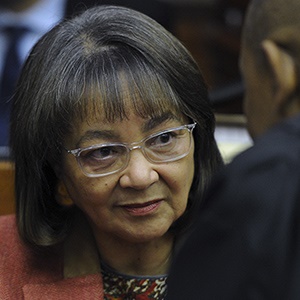
Political
parties are not private entities that can do as they wish in the management of
their internal affairs. They must comply with their own constitutions.
The constitutions of political parties must themselves be constitutional. In other words, they must be consistent with the Constitution of the Republic of South Africa.
In summary, these are the legal bases on which a full Bench of the Western Cape High Court in Patricia De Lille vs Democratic Alliance found the DA violated its own constitution in terminating Cape Town Mayor Patricia De Lille’s party membership.
The party failed on two key points. First, the federal legal commission that should have decided De Lille's fate and made recommendations to the federal executive was not properly constituted as stated in the constitution of the party. Secondly, the party violated its own constitution by rushing to automatic cessation of membership without fulfilling the requirement to give De Lille a hearing.
Political opponents of the DA are understandably excited that the party that built its reputation around the advocacy of constitutionalism has failed miserably to practice what it preaches. Many of the DA’s opponents are heaping praise on De Lille for fighting the DA. This is to be expected. In politics, the curse of one party due to its own blunders is the blessing of another.
Leaders of other political parties who feel blessed now would be naïve to think that the ruling is applicable strictly to the DA. It was clear from the beginning that the DA’s single-minded obsession and haste to get rid of Patricia de Lille, without due regard to processes, would end in a legal and political embarrassment.
But the implications of the judgment go beyond the DA. It is a victory to all those who are members of political parties and who wish to participate fully in the activities of their parties in line with the agreed rules and policies of those parties.
The judgment entrenches in our constitutional democracy the importance of constitutional conduct by leaders of political parties. They are not untouchable sovereigns with absolute power to decide which of their own rules to obey, when and how. Arbitrary conduct is outlawed. Legality gets a boost.
This is politically significant because political parties, except the South African Communist Party, by their very nature exist to win public power through election to govern our republic. A party that cannot run its own affairs in accordance with its own constitution would make the public doubt its ability to comply with the demands of the Constitution of the republic. Constitutional compliance must start with the internal culture of a party.
Patricia De Lille vs Democratic Alliance is a thorough reinforcement of Ramakatsa, a 2012 Constitutional Court judgment which found against the ANC for excluding some of its members from participating in party structures ahead of the Mangaung electoral conference. The ground-breaking Ramakatsa gave proper legal meaning to political rights – the right to join a political party, to participate in its activities and to be subject to equal treatment.
In Patricia de Lille vs Democratic Alliance, the High Court referred to Ramakatsa several times. The court said members of a political party are entitled to demand and obtain compliance with the party’s constitution. After Ramakatsa, there was Crouwcamp in the Supreme Court of Appeal in 2014 which set aside the Civic Independent Party’s decision to expel its leader. The court found the expulsion was invalid because the organisation’s national executive committee that took that decision was improperly constituted. This judgment is also cited in the Patricia de Lille vs Democratic Alliance decision.
Read together with the Constitutional Court decision that will compel political parties to disclose their sources of funding, the De Lille decision entrenches public accountability of political parties. The fact that their internal conduct or decisions can be reviewed and set aside by courts if found unlawful is an important accountability check. (The ANC’s threat to discipline members who approach courts when they are throttled by factions is unconstitutional.)
On the downside, though, the Western Cape High Court refused to be drawn into the argument whether the Promotion of Administrative Justice Act was applicable in the De Lille matter. The judges conceded that it was tempting to delve into that debate, but they resisted the temptation.
Had the court dealt with this issue, it might have helped clarify one of the most dangerous, yet legally unresolved matters: the extent to which a political party should exercise its power over its members who occupy government positions that are subject to state regulations. The separation of party and state requires resolution.
But it is clear that our courts are moving towards holding political parties to account. Political parties need not necessarily be in government before they are subject to scrutiny by their own members and the public. Nor should the public wait for them to assume political office before it is known who made it possible, financially, for them to ascend to the top.
In a matter about access to information on party funding, the Constitutional Court recently ruled in favour of disclosure. It said such disclosure would free public representatives to do what they promise and are obliged to do, unencumbered by potentially corrupt deals that could be enabled by undisclosed public funding. It helps that Parliament has passed a bill to facilitate disclosure.
Hopefully, it won’t be long before prospective public representatives are compelled to disclose their tax compliance status and their lifestyles are audited and results made public. We are getting there. Surely.
- Mkhabela is a political analyst with the Department of Political Sciences at the University of South Africa.
Disclaimer: News24 encourages freedom of speech and the expression of diverse views. The views of columnists published on News24 are therefore their own and do not necessarily represent the views of News24.




 Publications
Publications
 Partners
Partners






















